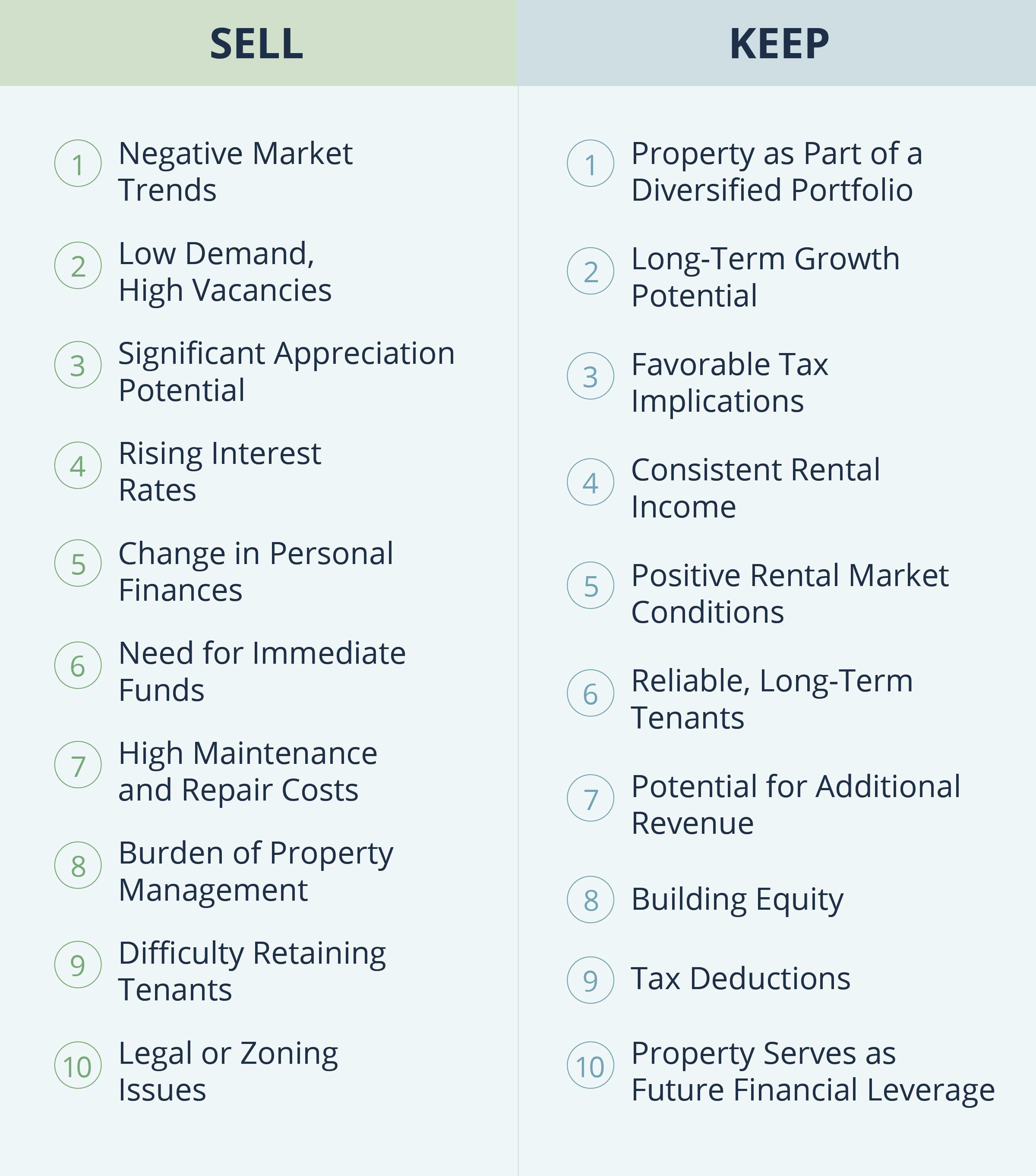
The real estate market is dynamic, and knowing when to sell your rental property as a property owner is challenging. Answering the question, “Should I sell my rental property?” requires careful consideration of various factors.
Forbes’ Housing Market Predictions for 2024 include a sluggish return to affordability, as mortgage rates remain high against a backdrop of historically low housing stock. But it’s not all doom and gloom. Single-family home construction continues to rise, indicating that builder confidence in the housing market is increasing.
If you’re on the fence, these mixed signals can make the decision to sell or hang on to your property difficult. This article explores ten signs that indicate it may be time to sell your rental property and ten signs that suggest you should hold on to it. We’ll also reveal ways to increase your property's value without raising rents and the role of a property manager in the decision-making process. If you decide it is time to sell—or even adjust how you manage your property—we can show you local experts that can help.

When To Sell Rental Property: 10 Signs
When determining the right time to sell your rental property, it’s all about knowing the market. These signs can help guide your decision-making. A combination of market trends, rental performance, and personal financial needs can mean it's time to seek out potential buyers and sell.
Market Conditions and Investment Analysis
1. Negative Market Trends: Market conditions significantly influence property values. If you notice negative trends, such as a decline in property prices, changes in the stock market, or a slowdown in the local real estate market, it might indicate that it's time to sell your rental property. These trends can negatively impact the value of your property and limit your profit potential.
2. Low Demand, High Vacancies: Rental demand is an essential factor to consider when selling a rental property. If you are experiencing difficulty attracting tenants and your property sits vacant, it may indicate that the demand for rentals in the area has decreased. To determine the demand for rentals in your location, conduct thorough market research and evaluate whether it aligns with your real estate investment goals.
3. Significant Appreciation Potential: Local real estate markets with significant appreciation potential can be attractive opportunities for selling a rental property. If the market is projected to experience substantial property value growth in the coming years, selling now could allow you to capitalize on the appreciation and maximize your return on investment. To assess the appreciation potential in your area, keep an eye on market forecasts, consult local real estate experts, and consider long-term market trends.
4. Rising Interest Rates: Higher interest rates mean increased mortgage costs, reducing cash flow and eating into rental income. Assess the current interest rate environment and project the impact of rising rates on your property's cash flow. If rising interest rates affect profitability, then selling property may be viable.
Financial Considerations
5. Change in Personal Finances: Personal financial circumstances can impact the decision to sell a rental property. Major life events such as job loss, major expenses, or changes in income can create economic challenges that influence your financial situation. Selling your rental property can provide liquidity and alleviate financial strain if necessary.
6. Need for Immediate Funds: Selling your rental property can be viable if you need immediate cash flow or funds for other investments. Assess your investment priorities and determine if selling aligns with your short-term and long-term financial goals.
7. High Maintenance and Repair Costs: Selling a rental property can be more financially prudent if repairs and maintenance costs outweigh the potential returns. Calculate the cost of repairs and maintenance over time and weigh it against the potential returns.
8. Burden of Property Management: Selling a rental property relieves you of the burdens associated with property management (especially if you don’t already work with a professional property manager), so consider your personal situation and lifestyle when assessing whether the burden actually outweighs the benefits of renting out your property.
Property Performance
9. Difficulty Retaining Tenants: It may be time to sell if you consistently struggle to find and retain reliable tenants for your rental property. High tenant turnover and frequent vacancies can negatively impact your rental income and increase property management efforts. Evaluate the rental market, tenant demand, and ability to attract and retain quality tenants to determine if selling the property is a solution.
10. Legal or Zoning Issues: Legal or zoning issues can affect the viability and profitability of a rental property. If legal disputes, zoning restrictions, or regulation changes impede the ability to use or rent the property, selling may be wise. Consult legal professionals to understand the implications of these issues and know exactly where you stand.
By recognizing these signs and carefully evaluating your circumstances, you can make an informed choice about selling your rental property and maximizing your returns.
When To Keep Your Rental Property: 10 Signs
Holding onto your rental property can be a strategic move, even when one or more of the considerations above are at play. Understanding the signs that indicate it's the right time to hold on can help you weigh the pros and cons and make a well-informed decision.
Long-Term Investment Strategy
1. Property as Part of a Diversified Portfolio: Holding onto a rental property can be beneficial if it is part of a diversified investment portfolio, providing stability and a hedge against market volatility. It can also help spread risk across different asset classes, making it beneficial in the long run.
2. Long-Term Growth Potential: Analyzing market trends, economic indicators, and future development plans in the area can help determine if it is wise to hold onto a rental property. If there is evidence of sustained growth and appreciation, retaining the property can allow for increased property value over time.
3. Favorable Tax Implications: Tax deductions for property expenses, depreciation, and other eligible deductions can help reduce taxable income and increase profitability. Consult a tax professional to understand the tax advantages of owning a rental property.
Steady Cash Flow
4. Consistent Rental Income: If a rental property generates consistent passive income that exceeds expenses, it can be a strong indicator to hold onto it. To calculate net cash flow, subtract operating expenses from the rental income. A positive cash flow demonstrates the property's ability to generate revenue and support investment goals.
5. Positive Rental Market Conditions: Analyze local rental market trends, demographics, and economic indicators to ensure the area has a strong and sustainable demand for investment properties. Low vacancy rates, high demand, and increasing prices can be compelling reasons to retain a rental property.
6. Reliable, Long-Term Tenants: Reliable tenants who consistently pay rent on time and sign long-term leases can provide stability and minimize risks associated with vacancies. They also contribute to a steady cash flow and reduce the need for frequent listings, showings, and other marketing efforts for your rental units.
7. Potential for Additional Revenue: Explore the potential for additional revenue streams within your rental property. Offering laundry facilities, storage spaces, or parking amenities can generate extra income without significantly raising rents.
Equity Build-Up and Tax Benefits
8. Building Equity: Building equity in a rental property over time through mortgage payments and property appreciation can provide long-term wealth-building opportunities and the potential for future financial leverage.
9. Tax Deductions: Rental property ownership offers tax benefits, such as deductions for property-related expenses and depreciation, which can offset taxable income and reduce tax liability. Consult a tax professional to maximize the deductions and navigate property taxes.
10. Property Serves as Future Financial Leverage: Retaining a rental property provides a valuable asset for future financial opportunities, such as refinancing, securing loans, and diversifying investment portfolios.
Considering these signs will help you understand when to hold off from selling your rental property. They can also help you to take a hard look at your long-term goals, which can help you find new ways to leverage your property for steady income and long-term value appreciation, even with uncertainty in the current market.
Ways to Increase Property Value Without Raising Rents
If you've decided to keep your property, you may be looking for creative ways to increase the value of your rental property. Luckily, there are several strategies you can employ that don't involve raising the rent. Consider implementing the following approaches to enhance the attractiveness and desirability of your property.
Enhancing Services and Amenities
The most effective way to add value to a rental property is to offer additional conveniences and benefits. This can include a pet-friendly policy, high-speed internet, on-site laundry facilities, and community-oriented initiatives such as organizing resident events or social gatherings. These can help create a positive living experience and increase tenant satisfaction.
Additionally, offering pet amenities such as designated pet areas, pet waste stations, or partnering with local pet services can help create a positive living experience and increase tenant satisfaction.
High-speed internet, on-site laundry facilities, and community-oriented initiatives can all foster a positive living experience and increase tenant satisfaction.
Cost-Effective Upgrades and Renovations
Identifying cost-effective upgrades and renovations can significantly boost the value of a rental property. These include upgrading kitchen appliances or bathroom fixtures, improving the curb appeal, installing energy-efficient lighting and appliances, and enhancing the property's appeal and functionality.
Upgrading kitchen appliances or bathroom fixtures can give the property a modern and attractive look without breaking the bank, while landscaping improvements such as adding fresh plants and flowers, maintaining a well-manicured lawn, and enhancing the entrance with new lighting or a fresh coat of paint can make a difference in attracting potential tenants.
Energy-efficient upgrades— such as LED lighting, low-flow faucets and showerheads, and energy-efficient appliances.— can improve the property's functionality and attract tech-savvy tenants.
Role of a Property Manager in Determining When To Sell Rental Property
When it comes to making decisions about your rental property, the expertise of a property manager can be invaluable. Here are some key ways they can help.
Professional Market Analysis
Property managers possess a deep understanding of the rental market and can provide a professional market analysis that answers your specific questions. They assess current market conditions, analyze trends, and evaluate factors that may impact the value of your property. Their market analysis involves determining rental rates and property value, conducting comparative analyses of similar investment properties, and identifying opportunities for rental income growth. By leveraging their knowledge and experience, property managers can help understand the potential financial outcomes of selling or holding onto a property.
Tenant Management
Property manager's core responsibilities include managing tenants, minimizing vacancies, and ensuring lease agreements and rent collection are handled efficiently. They have extensive networks and marketing resources to attract qualified applicants, conduct thorough tenant screenings, handle tenant inquiries, showings, and lease negotiations, and handle rent collection on your behalf. They also enforce lease terms and manage lease renewals or terminations, maintaining a smooth and streamlined rental process.
Property Optimization
Property managers help maximize property value by managing maintenance issues and improvements. They develop and execute proactive maintenance plans, coordinate repairs and renovations, and conduct market research. They also increase tenant satisfaction and encourage longer lease terms.
Deciding to sell or hold onto your rental property is one of the most important decisions real estate investors and rental property owners make. You can make an informed choice by considering the signs mentioned in this article and evaluating your particular circumstances.
Remember, answering the question, “Should I sell my rental property?” isn’t something that can be done overnight—and you don’t have to do it alone.
You can benefit from professional guidance from a property management company who provides valuable insights and assistance. They can help you assess your options carefully and consider your long-term property goals and overall financial objectives.
To get started, find a property manager that can help you navigate your decision and optimize your rental property's value.
